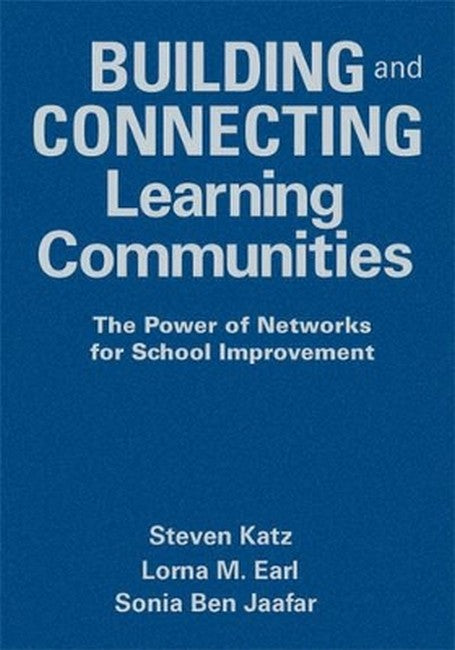Steven Katz is the director of Aporia Consulting Ltd. and a faculty member in the Applied Psychology and Human Development at the Ontario Institute for Studies in Education of the University of Toronto (OISE, UT), where he teaches in the Child Study and Education graduate program. He is the recipient of the OISE, UT- wide award for teaching excellence. Steven has a PhD in human development and applied psychology, with specialization in applied cognitive science. His areas of expertise include cognition and learning, teacher education, networked learning communities, leading professional learning, and evidence-informed decision making for school improvement. He has received the Governor General's Medal for excellence in his field and has been involved in research and evaluation, professional development, and consulting with a host of educational organizations around the world. He is the author of several best-selling books, including Leading Schools in a Data-Rich World, Building and Connecting Learning Communities, Intentional Interruption, and The Intelligent, Responsive Leader. Lorna M. Earl is a director of Aporia Consulting Ltd. and a retired associate professor from the Department of Theory and Policy Studies at the Ontario Institute for Studies in Education of the University of Toronto. She was the first director of assessment for the Ontario Education Quality and Accountability Office, and she as been a researcher and research director in school districts for over 20 years. Throughout her career, Earl has concentrated her efforts on policy and program evaluations as a vehicle to enhance learning for pupils and for organizations. She has done extensive work in the areas of literacy and the middle years, but has concentrated her efforts on issues related to evaluation of large-scale reform and assessment (large-scale and classroom) in many venues around the world. She has worked extensively in schools and school boards, and has been involved in consultation, research, and staff development with teachers' organizations, ministries of education, school districts, and charitable foundations. Earl holds a doctorate in epidemiology and biostatistics, as well as degrees in education and psychology. Sonia Ben Jaafar is a research associate at Aporia Consulting Ltd. She works internationally to support policy and program development and implementation through applied research and evaluation. Her areas of expertise include assessment, accountability, educational reform, policy and program development, and comparative studies. Ben Jaafar graduated from the Ontario Institute for Studies in Education of the University of Toronto with a PhD in theory and policy studies. She also holds an MA in curriculum, teaching, and learning; a BEd specialized in science education; and a BSc in biochemistry.
Request Academic Copy
Please copy the ISBN for submitting review copy form
Description
Preface Acknowledgments About the Authors 1. Why Networks? Why Now? It's About Learning Networks: A Powerful Organizational Tool Time for Reflection 2. How Networked Learning Communities Work What Are Networked Learning Communities? How NLCs Work: The Theory of Action Using NLCs to Focus Local PLCs The Anatomy of a NLC: A Refined Theory of Action Time for Reflection 3. Establishing a Clear and Defensible Focus Focus Foremost Evidence-Based Focus From a School Focus to a Network Focus Time for Reflection 4. Collaborative Inquiry to Challenge Thinking and Practice The Importance of Relationships From Inquiry to an Inquiry Habit of Mind From Relationships to Deep Collaboration Getting to Powerful Collaborative Inquiry Time for Reflection 5. Leadership in Networked Professional Learning Communities Roles of Formal Leaders Roles of Informal Leaders Time for Reflection 6. From Student Learning to Teacher Learning Towards Focused Collaborative Inquiry Collaborative Inquiry for Teacher Leaders Within-School Focused Professional Learning: Collaborative Inquiry for Teachers Time for Reflection 7. Using the Network to Support Professional Learning for Leaders Collaborative Inquiry and Focused Learning for Leaders Using Critical Friends to Promote Inquiry and Focus Efforts From Collaborative Inquiry to Instructional Leadership Actions Time for Reflection 8. Sustaining Networked Learning Communities Sustaining Collective Understanding Sustaining Professional Learning Sustaining and Broadening Leadership Sustaining Powerful Networked Learning Communities Time for Reflection References Index
"Taking your school from great to greater-to get there, this compelling book gives you tools to use with staff for reflecting on and refining your professional practices. It provides you and your team with effective options for taking learners to the next level of improvement." -- Lynn A. Kaszynski, Principal

